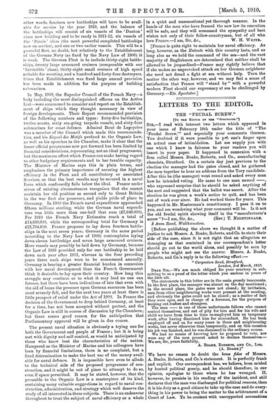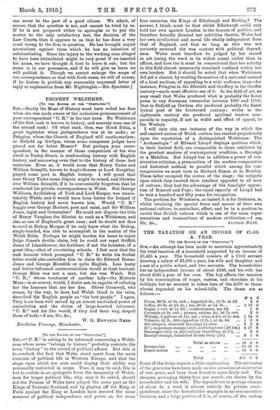LETTERS TO THE EDITOR.
THE "FEUDAL SCREW."
(TO tax EDITOR OP Vile SPECTATOR:1
read with interest two letters which appeared in your issue of February 19th under the title of "The 'Feudal Screw,'" and especially your comments thereon. You doubted if it were possible to pat one's finger upon an actual case of intimidation. Let me supply you with one which I know in fairness to your readers you will insert in your paper. It happened in connexion with a firm called Messrs. Boake, Roberts, and Co., manufacturing chemists, Stratford. On a certain day just previous to the election the manager had the gates closed, and he gathered the men together to hear an address from the Tory candidate. After this he (the manager) went round and asked every man how he intended voting. He came to one man named —, who expressed surprise that he should be asked anything of the sort and suggested that the ballot was secret. After the election he was given a week's notice to quit, and has been out of work ever since. He had worked there for years. This happened in Mr. Masterman's constituency. I pass it on to you, and am wondering what your comment will be. Is it not the old feudal spirit showing itself in the "manufacturer's screw " P—I am, Sir, &c., (Rev.) T. NIGHTINGALE.
3 Avon Road, Walthamstow.
[Before publishing the above we thought it a matter of justice to ask Messrs. A. Boake, Roberts, andCo. to state their side of the case, since it is not right that an allegation so damaging as that contained in our correspondent's letter should go out to the world alone, and possibly be seen by people who might not see the answer. Messrs. A. Boake, Roberts, and Co.'s reply is to the following effect :—
" Carpenters Road, Stratford,
London, 3rd March, 1910.
DRAB Sra,—We are much obliged for your courtesy in sub- mitting to us a proof of the letter which you enclose in yours of the 24th ult.
The statements in this letter are in the main grossly inaccurate. In the first place, the manager was absent on the day mentioned ; in the second place, the gates were not closed; by invitation, men from other neighbouring works were present at the meeting, and obviously the gates could not be closed ; as a matter of fact they were open, and in charge of a foreman, for the purpose of keeping out loafers and strangers.
The man — is one of those unfortunate fellows who cannot control themselves, and out of pity for him and for his wife and child we have from time to time re-employed him on temporary work, after having dismissed him for misconduct. He has been employed off and on for many years in these and neighbouring works, but never otherwise than temporarily, and on this occasion his job was finished, and he was dismissed in the ordinary course.
We had no means of knowing how he proposed to vote, nor were any of the men present asked to declare themselves.— We are, Sir, yours faithfully,
A. Bows, EMMET% AND Co., LTD. (A. Boaxa.)" We have no reason to doubt the bona fides of Messrs. A. Boake, Roberta, and Co.'s statement. It is perfectly frank and explicit,. Our correspondent has, we believe, been misled by heated political gossip, and he should therefore, in our opinion, apologise to those whom he has wronged. If, however, he persists in his reading of the incident, and still declares that the man was discharged for political reasons, then it is his duty as a good citizen to take up the case and do every- thing in his power to bring the matter to the arbitrament of a Court of Law. To be content with unsupported accusations can never be the part of a good citizen. We admit, of course, that the question is not, and cannot be, tried by us. If he is not prepared either to apologise or to put the matter to the only satisfactory test, the decision of the Law Courts, then it appears to us that he has done a very cruel wrong to the firm in question. He has brought unjust accusations against them which he has no intention of substantiating. Since the injury to the working man alleged to have been intimidated might be very great if we inserted his name, we have thought it best to leave it out; but the name is in our possession, and if he will give us leave we will publish it. Though we cannot enlarge the scope of our correspondence or deal with fresh cases, we will of course, if he desires it, publish any reasonably expressed letter of reply or explanation from Mr. Nightingale.—ED. Spectator.]















































 Previous page
Previous page